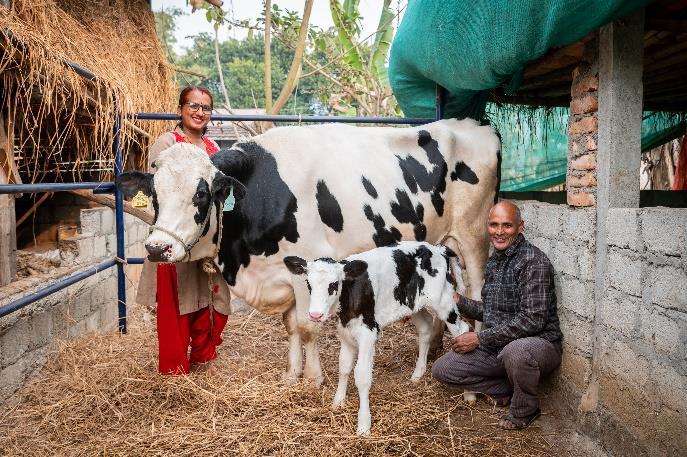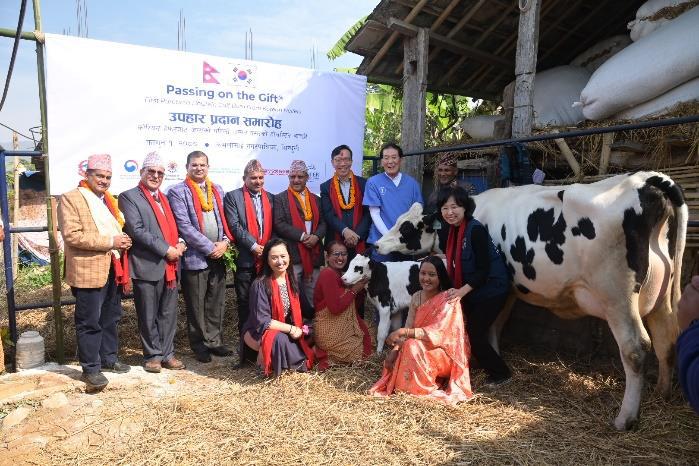The Milky Way
Program Period: March 2022- June 2027
Nepal’s dairy sector faces significant challenges, with low milk yields due to poor genetics, inadequate feeding practices, and a weak healthcare system for livestock. Government efforts to improve breeds have been hampered by a lack of systemic approach and limited access to quality genetic resources, compounded by export restrictions from other countries. A 2020 study highlighted that Nepali consumption of milk and dairy products stands at 72 liters annually, below the recommended 91 liters.
To address these challenges, Heifer International, in collaboration with the governments of Nepal and South Korea, launched the Milky Way project.

To address these challenges, Heifer International, in collaboration with the governments of Nepal and South Korea, launched the Milky Way project. This initiative aims to transform Nepal’s dairy sector by improving cattle genetics, creating a vertically integrated dairy value chain, and improving local milk production. The Milky Way Signature Program targets the livelihood improvement of over 500,000 smallholder dairy farmers and aims to reduce dairy product imports by 50%, while doubling milk production by 2030. The program focuses on increasing milk quality and productivity, reducing production costs, and creating job opportunities for local dairy farmers. By working closely with government bodies, development banks, private sector actors, and Korean partners, Milky Way addresses key systemic barriers across the dairy value chain. Its goal is to establish sustainable institutions and structures that will ensure lasting impact, reforming policies and practices to strengthen rural economies and ensure the sector’s long-term success.
Passing on the Gift: During the 1950s, war-stricken Korea was facing a humanitarian crisis with widespread hunger and poverty. The number of orphanages in the country grew rapidly and immediate intervention was needed. During such grave humanitarian crises, Heifer International shipped thousands of eggs followed by livestock to Korea. Heifer continued its work in South Korea until 1976, and the cattle played a vital role in the transformation of the Korean dairy industry making it one the biggest and best in the world today.
The Korean dairy farmers are grateful for this gift and as a token of generosity, the people of South Korea want to pass on the gift to the farmers of Nepal, completing a full circle of giving back. ‘Passing on the Gift’, one of heifer’s cornerstones, is fundamental to Heifer projects.
It inculcates the value of giving back, transforming recipients into donors, and building dignity and social capital in the community. This act of giving back to the community is an ongoing process which is internalized by the families we work with and has continued for generations.

In 2022, South Korea gifted Nepal a total of 100 heifers and 8 bulls from the Holstein family. The cattle were distributed among 51 dairy farming families in Sindhuli to establish an elite nucleus herd of bull mothers. The bulls were handed over to the National Livestock Breeding Offices in Pokhara, Lahan, and Nepalgunj, where frozen semen was used for artificial insemination. This marks the first time in known history that Nepal has received such a large shipment of animals as a gift. This year, in celebration of Heifer’s 80th anniversary and to continue the cycle of passing on the gift, 11 newly born heifers were gifted to 11 new families, continuing the spirit of generosity.
The Milky Way program’s envisioned outcomes include modernizing the national dairy value chain, strengthening the overall dairy sector ecosystem, and introducing and scaling a model based on improved genetics and enhanced animal management practices.

